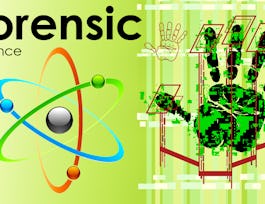The aim of this course is to promote critical thinking with regard to forensic science. Today, in general, most people are dazzled by the technical possibilities offered by forensic science. They somewhat live in the illusion that forensic evidence is fool proof and brings factual findings with 100% certainty. This course – given by specialists in the field – goes beyond the conventional image that is promoted through TV series such as CSI. It alerts (without alarming) the public on the limits of the techniques in order to promote a sound administration of forensic science in the criminal justice system. It allows participants to understand the importance of probabilistic reasoning in forensic science, because uncertainty is a constitutive part of forensic science. The course is constructed as a series of causes célèbres that could or have led to miscarriages of justice. Some of these cases have been part of case reviews carried out at the School of Criminal Justice of the University of Lausanne.


Challenging Forensic Science: How Science Should Speak to Court
Taught in English
Some content may not be translated
16,589 already enrolled
(437 reviews)
Details to know

Add to your LinkedIn profile
5 quizzes
See how employees at top companies are mastering in-demand skills


Earn a career certificate
Add this credential to your LinkedIn profile, resume, or CV
Share it on social media and in your performance review

There are 5 modules in this course
This first week will set the scene for the course. You will meet the instructors; learn about their background, teaching, research and casework activities. The School of Criminal Justice (University of Lausanne) will be shortly presented through a virtual visit, followed by the course objectives. The recent ENFSI guideline for evaluative reporting, used throughout the course, will be presented. ENFSI stands for the set of the good principles for writing forensic reports to be used in a court of law. The whole course aims at contrasting the practice as observed in notorious cases with the good practice promoted by the ENFSI guideline. Hence, we will start by setting out some reporting criteria that are essential to bring reliable evidence in court and explain the principles of interpretation (based on the concept of likelihood ratio) that should govern the production of any forensic evidence. The application of these principles leads to a defined way whereby the forensic scientist is entitled to speak to court.
What's included
12 videos7 readings1 quiz
There is a general misconception that a piece of forensic evidence is sufficient to clinch the outcome of a case. This module aims at showing that the reality is more subtle and is intrinsically linked to the concept of hierarchy of propositions. Cases based on DNA and gunshot residue (GSR) evidence will be analysed and discussed. First, through the Weller case we will demonstrate the DNA findings providing information towards the source of the DNA may not be at the core of the issue in the case. More and more the source of the DNA is not challenged, but how the DNA got there is.
What's included
8 videos1 reading1 quiz
Based on international cases (Knox, Jama, Anderson and Scott) we will illustrate the potentials aspects that one needs to consider when assessing the value of DNA found in small quantity. You will be shown how one performs DNA analysis and what type of results can be produced. We will apply the ENFSI and the ISFG guidelines for evaluative reporting in the case at hand and see if the principles advocated allow avoiding misleading evidence. We will compare the situations where large quantities of blood are found to cases where low template DNA is recovered. You will learn to contrast these two situations and discover what type of results can be expected and what methods allow a balanced and robust interpretation. This first part of the course will demonstrate that very sensitive techniques require robust interpretation methods. In the second part of the course, you will understand that with trace quantities, stringent control procedures are needed on the crime scene and in the laboratory. Indeed, pollution (or so-called contamination) is an aspect one needs to take into account. Cases (for example in Australia, the USA and England) have shown that the traces from the crime scene can be polluted at the hospital, by paramedics or in the laboratory. It is thus essential to consider this possibility, especially when DNA is the central (and only) element supporting the allegation of a person’s involvement in a crime. How to take into consideration the possibility of error/contamination when assessing the results will be presented.
What's included
12 videos1 reading1 quiz
This week will be dedicated to how forensic scientists should convey the value of their results. From our white room dedicated to photography, we will study famous cases - including the Dreyfus case- and see how statistics can be misused. It will allow us to discuss how statistical values ought to be presented in court. A statistician (Phil Dawid) and a legal scholar (David Kaye) will be interviewed. The second essential topic we will present will be on fallacious reasoning, and in particular on what has been coined, more than thirty years ago, the prosecutors fallacy. Bill Thompson, the first to have described this fallacious argument used in court will be another of our guest interviewees.
What's included
8 videos1 reading1 quiz
This week will be present the Dallagher case involving earprints, the Mayfield and the McKie cases involving fingerprints. We want to make you understand what is at stake when an expert decides to conclude to an identification. You will understand through this week that identification is not the duty of the forensic scientist and that it is a decision that must be taken by the Court. We also want to highlight the possible causes for wrong identification. And yes they do occur, even with fingerprints! We will have the privilege to listen to interviews of persons closely involved in these cases: The father of Shirley McKie as well as Brandon Mayfield and her daughter Sharia.
What's included
12 videos1 reading1 quiz
Instructors


Offered by
Recommended if you're interested in Law

University of Illinois at Urbana-Champaign

National Taiwan University

National Taiwan University

Nanyang Technological University, Singapore
Why people choose Coursera for their career




Learner reviews
Showing 3 of 437
437 reviews
- 5 stars
87.41%
- 4 stars
10.75%
- 3 stars
1.60%
- 2 stars
0.22%
- 1 star
0%

Open new doors with Coursera Plus
Unlimited access to 7,000+ world-class courses, hands-on projects, and job-ready certificate programs - all included in your subscription
Advance your career with an online degree
Earn a degree from world-class universities - 100% online
Join over 3,400 global companies that choose Coursera for Business
Upskill your employees to excel in the digital economy
Frequently asked questions
Access to lectures and assignments depends on your type of enrollment. If you take a course in audit mode, you will be able to see most course materials for free. To access graded assignments and to earn a Certificate, you will need to purchase the Certificate experience, during or after your audit. If you don't see the audit option:
The course may not offer an audit option. You can try a Free Trial instead, or apply for Financial Aid.
The course may offer 'Full Course, No Certificate' instead. This option lets you see all course materials, submit required assessments, and get a final grade. This also means that you will not be able to purchase a Certificate experience.
When you purchase a Certificate you get access to all course materials, including graded assignments. Upon completing the course, your electronic Certificate will be added to your Accomplishments page - from there, you can print your Certificate or add it to your LinkedIn profile. If you only want to read and view the course content, you can audit the course for free.
You will be eligible for a full refund until two weeks after your payment date, or (for courses that have just launched) until two weeks after the first session of the course begins, whichever is later. You cannot receive a refund once you’ve earned a Course Certificate, even if you complete the course within the two-week refund period. See our full refund policy.




